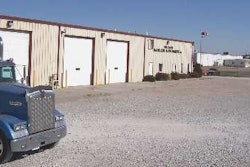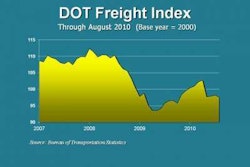PeopleNet, a provider of integrated onboard computing and mobile communications systems, announced Monday, Oct. 18, that it has developed a wireless roadside-inspection (WRI) solution in conjunction with the Federal Motor Carrier Safety Administration’s Commercial Motor Vehicle Safety Technology Showcase held last week in Tennessee.
PeopleNet says four customer fleets are participating in an operational test of the technology, and that the solution is the result of a joint effort with FMCSA and the Oak Ridge National Laboratory to improve motor carrier safety through increasing the frequency of roadside inspections using wireless technologies.
“Roadside identification of CMV violations is becoming a bigger challenge as the number of trucks and truck mileage grow each year, while roadside safety inspection resources do not,” says Brian McLaughlin, PeopleNet chief operating officer. “A wireless solution offers a way to not only dramatically increase the number of inspections, but also make them less time-intensive than traditional roadside inspections. The result is increased transportation productivity and mobility.”
PeopleNet says FMCSA estimates that inspections can increase from 3.4 million to 85 million, making it possible for carriers to receive credit for positive inspections and safe operations without uses enforcement staff to conduct inspections. FMCSA is spearheading WRIs to increase efficiency in using resources by identifying violations prior to manual inspections as the carrier enters an inspection station, which will allow enforcement staff to focus only on unsafe drivers/vehicles and reduce the demand for physical inspections, which will reduce delays, fuel use and emissions. In addition, in the absence of a nearby inspection station, WRI can provide alerts to carriers and enforcement staff for drivers or vehicles operating with high-risk violations.
WRI also supports Comprehensive Safety Analysis 2010 by enabling more frequent driver and vehicle safety assessments to ensure compliance and improve CMV safety. Assessment information can be transmitted automatically to the BASICs database immediately for updating scores in real time. PeopleNet says increased assessments will reduce accidents and costs associated with fatalities, injuries and property damage; other benefits include reduced congestion and delay, emissions, energy consumption, delays at border crossings and other inspection points, and the potential to reduce insurance costs by better identification of risks.
The company also announced a new Vehicle Management Multibus Adapter that expands vehicle data collection to J1939 fields to enhance information reporting, scorecards and dashboards. “As vehicle manufacturers continue the move towards providing only J1939 engine data via the ECM and reduce support for J1708, fleets need the flexibility to communicate with either data bus using a single hardware solution,” says Ron Konezny, PeopleNet chief executive officer. “With the Multi-bus Adapter, PeopleNet collects data from both data networks simultaneously. Customers realize cost savings and maintenance simplicity with a single hardware configuration for their entire fleet of both new and older vehicles.”
PeopleNet says the Multi-bus Adapter also captures new information such as Top Gear, Seat Belt use, Cruise and Engine Load; these data elements drive advanced analysis of driver and vehicle performance across PeopleNet’s reports, scorecards and Vusion analytics to improve driver safety and fleet fuel efficiency. The Multi-bus Adapter also enables real-time integration with stability control systems from Bendix and Meritor/WABCO that communicate via J1939, providing visibility of critical driving events and greatly improved fleet safety.
In addition, the Multi-bus Adapter makes integration easier between the PeopleNet onboard computer and other third-party systems, such as lane departure warning, tire pressure monitoring and onboard cameras. And while many vehicles misreport power take-off (PTO) event start and stop times through the engine cable monitor, PeopleNet says that by directly connecting to the PTO switch, PeopleNet’s new Multi-bus Adapter drives improved fuel efficiency and fuel tax reporting precision by collecting the data with 100 percent accuracy.
The Vehicle Management Multi-bus Adapter consolidates data from the J1708/1587 data bus, J1939 data bus, CAN data bus and PTO switch data. Collected data is delivered to the PeopleNet onboard computer via the standard vehicle connection. The company says this single-integration approach also helps fleets address the decline of vehicles being manufactured with the J1708 data bus.











